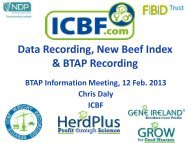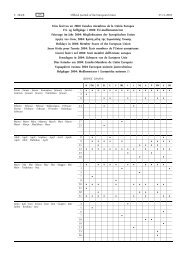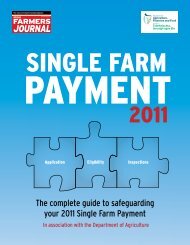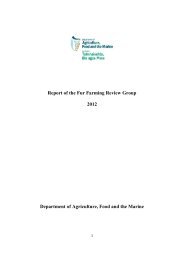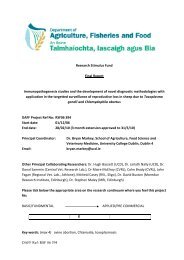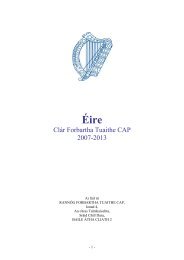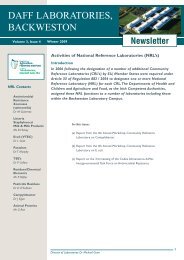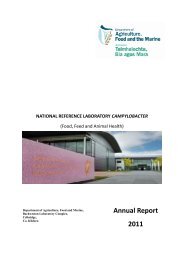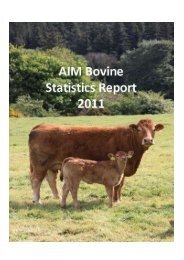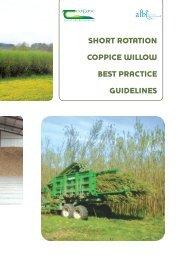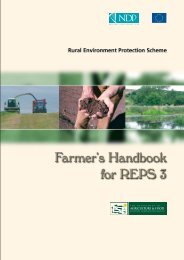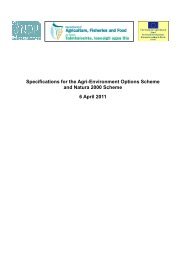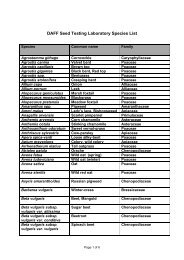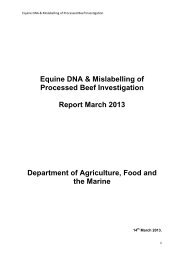Food Research Ireland - Department of Agriculture
Food Research Ireland - Department of Agriculture
Food Research Ireland - Department of Agriculture
You also want an ePaper? Increase the reach of your titles
YUMPU automatically turns print PDFs into web optimized ePapers that Google loves.
<strong>Food</strong>-borne viruses have been characterised and mechanisms to<br />
determine the virulence characteristics <strong>of</strong> many pathogens and viruses<br />
have been defined. New assays to rapidly and cost effectively monitor<br />
the growth <strong>of</strong> food spoilage and pathogenic organisms are being<br />
developed. The lux (based on a principle <strong>of</strong> light emission) technology<br />
has been previously proven to track infectious organisms and is now<br />
been developed as a tool to assure food safety. Novel rapid testing kits<br />
for Salmonella which reduce the time <strong>of</strong> testing from 4 days to less than<br />
2 days have been developed and these new tests have been validated<br />
against the standard ISO 6579 cultural method and provide a more rapid,<br />
equally sensitive and specific detection <strong>of</strong> Salmonella on meat, cheese<br />
and milk. Furthermore, the assays have the ability to specifically identify<br />
emerging multi-drug resistant serovars. The incidence and detection <strong>of</strong><br />
mycotoxins in cereals have been extensively studied and work has<br />
recently been completed on assessing the ability <strong>of</strong> food spoilage- and<br />
food pathogenic- microbes to withstand stress, making them more able<br />
to survive in foods and drinks.<br />
There is significant research expertise in the development <strong>of</strong> rapid testing<br />
methods to detect anti-parasitic drug residues in animal liver samples<br />
using a surface plasmon resonance (SPR) biosensor. A multi-residue<br />
confirmatory and screening method for the detection <strong>of</strong> veterinary drug<br />
and feed additive residues in foods <strong>of</strong> animal origin has also been<br />
developed. A rapid nucleic-acid based assay to measure gram positive<br />
and negative bacteria has also been developed. This method, based on<br />
a specific PCR detection method, has been validated against the gold<br />
standard method for meat and <strong>of</strong>fers time and precision advantages to<br />
clients for microbiological assessment <strong>of</strong> perishable food products.<br />
<strong>Ireland</strong> also has research expertise in the detection, survival, prevalence<br />
and molecular characterisation <strong>of</strong> Mycobacterium avium paratuberculosis<br />
and rotavirus as well as the development <strong>of</strong> a real time PCR test for the<br />
detection <strong>of</strong> Listeria monocytogenes in foods.<br />
<strong>Research</strong>ers are also examining the use <strong>of</strong> Fluorescent active cell sorting<br />
(FACS) for the rapid detection and enumeration <strong>of</strong> spoilage and<br />
pathogenic microorganisms in foods. This method could provide almost<br />
real time quality control data within a food processing environment,<br />
reduce product recalls and provide a greater level <strong>of</strong> assurance for the<br />
consumer.<br />
The National <strong>Food</strong> Safety Database (NFSD) is a programme funded by<br />
DAFM under FIRM and the <strong>Department</strong> <strong>of</strong> Health and Children via the<br />
Health <strong>Research</strong> Board. This programme continues to develop <strong>Ireland</strong>’s<br />
food safety infrastructure and builds on the existing National databases<br />
on residues, ingredients and supplements and biological contaminants.<br />
The NFSD will integrate and cob-ordinate surveillance, research and<br />
expertise in the areas <strong>of</strong> chemical and biological contaminants as well as<br />
nutrition and health data to provide meaningful information for<br />
consumers, regulators and policy makers. Rapid detection methods for<br />
antibiotic residues in food have also been developed.<br />
Irish researchers have expertise in the area <strong>of</strong> bio-preservation and shelflife<br />
extension using food-derived bioactive ingredients to control and<br />
eliminate pathogenic and food spoilage microorganisms in ready-to-eat<br />
foods. New antifungal compounds from lactic acid bacteria (LAB) have<br />
also been identified and these could be used as natural preservatives for<br />
improved food safety and extended shelf-life. Marine sponges and other<br />
marine species are also being mined to discover new bioactive<br />
compounds with activity against food-borne pathogens. Pathogen<br />
inactivation is also an area in which <strong>Ireland</strong> has research capacity.<br />
Approaches investigated include bacteriocins, anti-microbial peptides<br />
and electrolysed water.<br />
Many <strong>of</strong> the research organisations can provide scientific-based advice<br />
on strategies to reduce the pathogen load in food and beverages.<br />
<strong>Food</strong> <strong>Research</strong> <strong>Ireland</strong><br />
▼<br />
61



